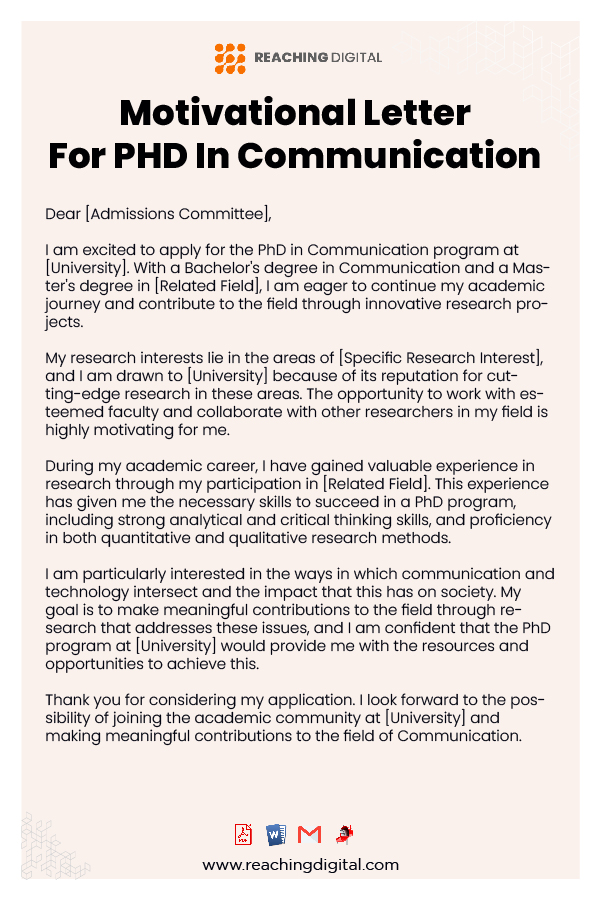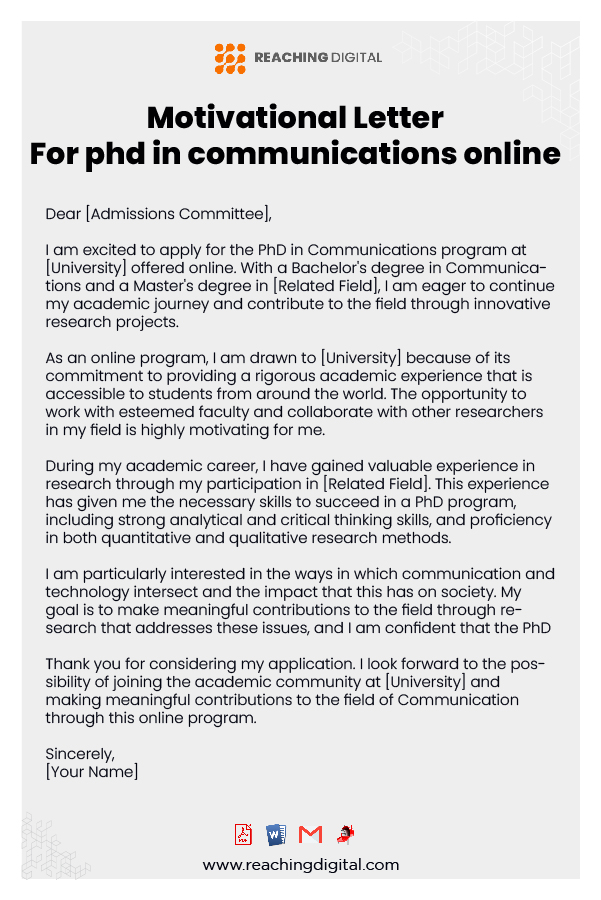Are you considering pursuing a PhD in Communication? The road to a doctoral degree can be long and challenging, but the rewards can be well worth the effort. In this blog post, we’ll explore what a Motivation Letter For PHD In Communication should include and how to make it stand out from the rest.
As a communication scholar, you can explore the complex interactions between individuals, organizations, and society, and contribute to the development of new knowledge and understanding in the field.
However, before you embark on this journey, you’ll need to submit a motivation letter that outlines your research interests, academic background, and reasons for pursuing a PhD. A motivation letter is a crucial part of your application and can make the difference between acceptance and rejection. So, if you’re ready to take the first step towards a career in communication research, keep reading!
Key Components of a Strong Motivation Letter For PHD In Communication
When crafting a strong motivation letter for a PhD in communication, some key components to consider include:
- Introduction: Introduce yourself and explain why you are interested in pursuing a PhD in communication. Keep it concise and engaging.
- Research Interests: Highlight your research interests in the field of communication and how they align with the research being conducted by the program or faculty you are applying to.
- Academic Background: Discuss your academic background, including your previous degrees and any relevant coursework or research experience that has prepared you for a PhD in communication.
- Professional Experience: If you have relevant professional experience, such as internships or work in the field of communication, briefly discuss how this experience has informed your decision to pursue a PhD.
- Goals and Objectives: Explain what you hope to achieve by obtaining a PhD in communication, both in terms of your personal goals and your contribution to the field.
- Fit with the Program: Demonstrate your familiarity with the program or faculty you are applying to and explain why you believe it is the best fit for your research interests and career goals.
- Conclusion: Summarize your main points and express your enthusiasm for the opportunity to pursue a PhD in communication.
Remember to keep your sentences short and concise to make your motivation letter easy to read and engaging.

Motivation Letter For PHD In Communication
Dear Admissions Committee, I am writing to express my strong interest in pursuing a PhD in Communication at [Name of University]. I am deeply passionate about exploring the intricate workings of communication and how it shapes our societies. Through my undergraduate and graduate studies, I have gained a solid foundation in the field, and I am eager to continue my academic journey to the highest level. My research interests lie in the intersection of media, culture, and society, particularly in the context of globalization and digitalization. I am interested in investigating the ways in which media and communication technologies are transforming our world and impacting our lives. With a PhD degree, I aspire to become an expert in the field and contribute to cutting-edge research. I believe that [Name of University] would provide the ideal environment for me to realize my academic and professional goals. The university's outstanding faculty and resources, combined with its commitment to interdisciplinary research, make it an exciting and challenging place to study. I am confident that I would thrive in this intellectually stimulating environment and contribute to the academic community. Thank you for considering my application. I am looking forward to the opportunity to further discuss my qualifications with you. Sincerely, [Your Name]
Dear Admissions Committee, I am writing to express my strong interest in pursuing a PhD in Communication at [University Name]. With a Bachelor's and Master's degree in Communication Studies, I am passionate about exploring the intersections of communication, technology, and society. My research interests include social media, digital culture, and media effects. I am eager to contribute to the field of Communication through my academic pursuits and research endeavors. I believe that [University Name] offers an excellent academic environment and research opportunities that align with my research interests. I am confident that pursuing a PhD at [University Name] will enable me to make significant contributions to the field of Communication. Thank you for your consideration, and I look forward to the opportunity to contribute to the academic community at [University Name]. Sincerely, [Your Name]
Motivation Letter PHD Communication
Dear [Admissions Committee], I am writing to express my strong interest in the PhD Communication program at [University Name]. With a Bachelor's degree in Communication and a Master's degree in Media Studies, I am eager to continue my academic journey and pursue my research interests in the field. My research interests include media effects, social media, and digital communication. I am particularly interested in exploring the impact of social media on political participation and the formation of public opinion. I believe that the PhD Communication program at [University Name] is the ideal place for me to continue my academic and professional development. The program's reputation for excellence, the caliber of its faculty, and its commitment to cutting-edge research make it the perfect fit for my research interests. I am confident that the PhD Communication program at [University Name] will provide me with the resources, support, and academic rigor necessary to achieve my career goals. I am excited about the opportunity to contribute to the program's research community and to collaborate with my fellow students and faculty members. Thank you for considering my application. I look forward to the opportunity to discuss my qualifications further. Sincerely, [Your Name]
Dear Admissions Committee, I am writing to express my strong interest in pursuing a PhD in Communication at your esteemed institution. With a Master's degree in Communication and years of experience in the field, I am confident that this program will provide the perfect opportunity for me to further advance my research and academic career. Throughout my academic journey, I have developed a deep passion for communication studies and its impact on society. My research interests lie in the areas of media ethics, political communication, and intercultural communication. I believe that pursuing a PhD in Communication will equip me with the necessary knowledge and skills to make significant contributions to these fields. In addition to my academic achievements, I have also gained valuable practical experience in the field of communication through my work with various organizations. These experiences have taught me the importance of effective communication in achieving organizational goals and have motivated me to pursue a career in academia. I am confident that your program will provide me with the resources and support needed to achieve my goals. I am excited about the opportunity to contribute to the research community and make a positive impact on society through my work. Thank you for considering my application. Sincerely, [Your Name]
PHD Motivation Letter For Communication
Dear Admissions Committee, I am writing to express my strong interest in pursuing a PhD in Communication at [University]. I am deeply passionate about studying the impact of communication on society and exploring ways to improve it. My academic background in communication studies, combined with my experience working as a communications specialist, has fueled my desire to advance my knowledge and contribute to the field through research. I am particularly drawn to the interdisciplinary nature of the program and the opportunity to work with esteemed faculty members. I believe that the PhD program at [University] will provide me with the necessary tools and resources to conduct meaningful research and make significant contributions to the field of communication. I am eager to collaborate with fellow students and faculty members to advance our collective understanding of communication. Thank you for considering my application. I look forward to the opportunity to join the community of scholars at [University] and contribute to the ongoing conversation on communication. Sincerely, [Your name]
Dear Admissions Committee, I am writing to express my interest in pursuing a Ph.D. in Communication at [University Name]. As an undergraduate student majoring in Communication, I developed a passion for studying the intricacies of human communication and its impact on society. My research interests lie in the intersection of media, technology, and culture, and how these factors influence communication patterns and social behavior. I am particularly interested in exploring the role of digital media in shaping public opinion and political discourse. I believe that pursuing a Ph.D. at [University Name] will provide me with the opportunity to further develop my research skills and contribute to the academic community. I am excited about the prospect of working with esteemed faculty members and engaging in interdisciplinary research. Thank you for considering my application. I look forward to the opportunity to contribute to the academic community at [University Name]. Sincerely, [Your Name]
Motivation Letter For PHD In Communication Studies
Dear Admissions Committee, I am writing to express my keen interest in pursuing a PhD in Communication Studies at your esteemed institution. With my background in media studies and experience in the field, I believe that this program would allow me to contribute significantly to the field of communication research. As someone who has always been fascinated by the power of communication, I am eager to delve deeper into the theoretical and practical aspects of this field. I am particularly interested in exploring the impact of new media on society and how it affects our communication patterns and behaviors. I am confident that the program's rigorous coursework, research opportunities, and exceptional faculty would provide me with the necessary tools and support to achieve my academic goals. I am excited about the prospect of joining your academic community and contributing to the advancement of knowledge in the field of communication studies. Thank you for considering my application. Sincerely, [Your Name]
Dear Admissions Committee, I am writing to express my strong interest in pursuing a PhD in Communication Studies at your esteemed institution. With a Bachelor's degree in Communication and a Master's degree in Journalism, I have developed a deep passion for exploring the ways in which people communicate and how that communication shapes our society. I am particularly interested in the role of media in shaping public opinion and the impact of new technologies on the ways in which we interact with each other. I am confident that the research opportunities and faculty expertise at your institution will enable me to develop a thorough understanding of these complex issues. I am excited to contribute to the academic community through my research and am committed to working hard to achieve academic excellence. Thank you for your consideration of my application. Sincerely, [Your Name]
Top Universities That Offer PHD In Motivation Letter For PHD In Communication
Attending the best universities in the world for a PhD in Communication is crucial for several reasons. These universities provide access to cutting-edge research, world-renowned faculty, and excellent resources. By attending one of these top institutions, PhD candidates can gain a competitive edge in the job market and make significant contributions to their field. Here are five universities that offer PhD programs in Communication:
- University of Pennsylvania
- Stanford University
- University of California, Berkeley
- University of Southern California
- University of Amsterdam.
In conclusion, pursuing a PhD in Communication at one of the top universities can greatly enhance a candidate’s career prospects and academic achievements.

Mistakes to Avoid in Writing a Motivation Letter For PHD In Communication
Motivation letters for PhD programs in communication are important to show your interest and qualifications. Avoid these mistakes:
- Focusing only on your academic achievements instead of personal motivations.
- Making generic statements instead of specific ones about the program and your research interests.
- Not addressing your potential supervisor and their research.
- Neglecting to proofread and edit for grammar and spelling errors.
In conclusion, it’s important to show your personal motivations and research interests, address your potential supervisor, and proofread your letter carefully.
Final Thoughts:
In conclusion, a well-written motivation letter is crucial for applying to a Ph.D. program in Communication. It should showcase your academic background, research interests, and career goals in a clear and concise manner. Additionally, you should emphasize your passion for the field and explain why you are a good fit for the program.
Remember, your motivation letter is the first impression you make on the admissions committee, so take the time to craft a compelling and persuasive message. Use specific examples and avoid clichés or generic statements. And don’t forget to proofread and edit your letter carefully to ensure that it is error-free and polished.
Thank you for taking the time to read this blog post. We hope that it has provided you with valuable insights into how to write a successful motivation letter for a Ph.D. program in Communication. If you have any feedback or questions, please feel free to leave a comment below. And don’t forget to visit our website for more ideas and resources on academic writing and research.






